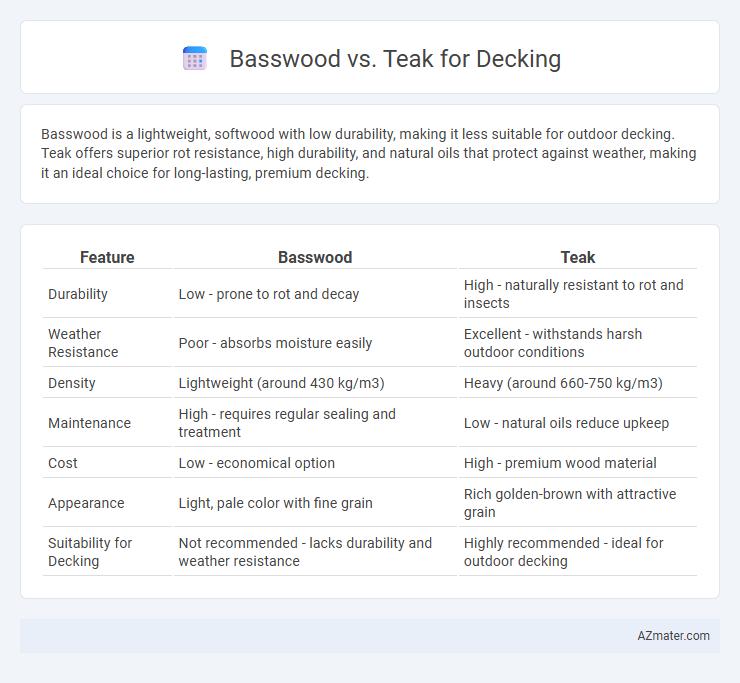Basswood is a lightweight, softwood with low durability, making it less suitable for outdoor decking. Teak offers superior rot resistance, high durability, and natural oils that protect against weather, making it an ideal choice for long-lasting, premium decking.
Table of Comparison
| Feature | Basswood | Teak |
|---|---|---|
| Durability | Low - prone to rot and decay | High - naturally resistant to rot and insects |
| Weather Resistance | Poor - absorbs moisture easily | Excellent - withstands harsh outdoor conditions |
| Density | Lightweight (around 430 kg/m3) | Heavy (around 660-750 kg/m3) |
| Maintenance | High - requires regular sealing and treatment | Low - natural oils reduce upkeep |
| Cost | Low - economical option | High - premium wood material |
| Appearance | Light, pale color with fine grain | Rich golden-brown with attractive grain |
| Suitability for Decking | Not recommended - lacks durability and weather resistance | Highly recommended - ideal for outdoor decking |
Introduction: Comparing Basswood and Teak for Decking
Basswood and teak are popular choices for decking, each offering distinct benefits. Teak is renowned for its exceptional durability, natural oils that resist moisture, and rich golden-brown color, making it ideal for outdoor applications. Basswood, while softer and less resistant to weather, provides a lightweight and affordable option with a fine, even grain suitable for areas with less exposure to harsh elements.
Basswood Overview: Characteristics and Uses
Basswood offers a lightweight, soft hardwood with fine, even texture ideal for detailed woodworking and indoor applications due to its low density and minimal grain pattern. It resists splitting and is easy to work with hand tools, although it lacks the natural oils and rot resistance of Teak, making it less suitable for prolonged outdoor exposure without treatment. Commonly used in indoor furniture, musical instruments, and carving, Basswood requires protective finishes when applied in decking to improve durability against moisture and insect damage.
Teak Overview: Characteristics and Uses
Teak is a highly durable hardwood prized for its natural oils that provide exceptional resistance to water, insects, and decay, making it ideal for outdoor decking in various climates. Its dense grain and rich golden-brown color enhance both aesthetics and longevity, often lasting decades with minimal maintenance. Commonly used in boat building and premium outdoor furniture, teak's strength and weather-resistant properties make it a top choice for high-end decking applications.
Durability: Basswood vs Teak
Teak offers superior durability for decking due to its high natural oil content, resistance to rot, insects, and weathering, making it ideal for long-lasting outdoor use. Basswood is significantly less durable, prone to moisture damage and insect attack, which limits its suitability for exposed decking applications. Decks made from teak can maintain structural integrity and aesthetic appeal for decades, whereas basswood requires frequent maintenance and replacement.
Resistance to Weather and Moisture
Teak is highly resistant to weather and moisture due to its natural oils and dense grain, making it an excellent choice for outdoor decking in wet climates. Basswood, while lightweight and easy to work with, lacks the same level of durability and is more prone to moisture absorption, leading to faster wear and potential swelling or warping. For long-lasting, weather-resistant decking, teak offers superior performance against environmental exposure compared to basswood.
Maintenance Requirements and Longevity
Basswood requires minimal maintenance but lacks the natural oils that provide resistance against moisture and insects, leading to a shorter lifespan compared to teak. Teak decking, rich in natural oils and dense grain, demands regular cleaning and occasional oiling to maintain its durability and resistance to rot, pests, and weathering. With proper care, teak can last 40-50 years, significantly outlasting basswood, which typically endures around 10-15 years under similar conditions.
Appearance and Aesthetic Appeal
Basswood decking showcases a light, creamy color with a fine, even grain that offers a smooth and subtle aesthetic ideal for modern and minimalist outdoor spaces. Teak features a rich golden-brown hue that deepens over time, combined with natural oily textures that enhance its luxurious, warm appearance and resistance to weathering. The choice between basswood's understated elegance and teak's bold, enduring beauty significantly influences the overall ambiance and visual impact of a deck.
Cost Comparison: Basswood vs Teak Decking
Basswood decking is significantly more affordable than teak, with prices ranging from $3 to $5 per square foot compared to teak's $15 to $30 per square foot. The lower cost of basswood makes it a budget-friendly option for large decking projects, while teak's higher price reflects its superior durability, natural oils, and weather resistance. Choosing between basswood and teak depends on balancing upfront cost with long-term investment in maintenance and longevity.
Environmental Impact and Sustainability
Basswood decking offers a more sustainable option due to its fast growth rate and widespread availability, resulting in lower environmental impact from harvesting. Teak, while highly durable and resistant to weather, often involves deforestation in tropical rainforests, raising significant sustainability concerns. Choosing FSC-certified teak or sustainably sourced basswood significantly reduces ecological footprint by supporting responsible forestry practices.
Conclusion: Which is Better for Your Deck?
Teak offers superior durability, natural resistance to rot and insects, and a rich golden color that ages gracefully, making it ideal for long-lasting, low-maintenance decking. Basswood, while more affordable and lightweight, lacks the hardness and weather resistance required for outdoor decks exposed to harsh elements. For a resilient, aesthetically pleasing deck with minimal upkeep, teak is the preferred choice.

Infographic: Basswood vs Teak for Decking
 azmater.com
azmater.com